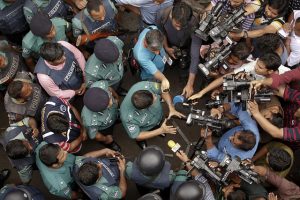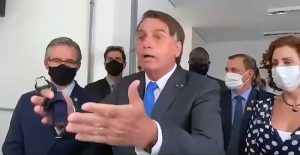London “Even after Trump leaves the White House, we still have “mini-Trumps” around the world, and they pose a threat to global press freedom with their raging rhetoric and policies.
This is the view of Reporters Without Borders’ global campaigns director, Rebecca Vincent, in an interview with MediaTalks following a meeting held by the FPA (Foreign Press Association) to talk about the 2022 Press Freedom Index released this Tuesday.
Along with Rebecca, three journalists participated, who well represented the moment of threat to journalism: Stuart Ramsay, the British correspondent for SkyNews, was wounded in an ambush during the Ukraine war; Kris Cheng, former editor of the Hong Kong Free Press, who has fled China’s pressure on the media in the region, and Eugenya Dillendorf, a former London correspondent for Novaya Gazetta, a Russian newspaper whose operations are led by Nobel Peace Prize winner Dmitry Muratov, whose operations have recently become operational. suspended.
Polarization in social media and freedom of the press
This World Press Freedom Index This year, in which Brazil ranks 110th out of 180 countries, draws attention to what RSF calls the “age of polarization”.
The organization uncontrollably criticizes the attacks on journalism amplified by social networks. And also the so-called “opinion media” in the American Fox News model, which deepens divisions.
Commenting on the polarization and disinformation surrounding the Ukraine war, Rebecca Vincent said she was not surprised. She believes that if the current agenda were not for conflict, something similar would have happened among many current agendas around the world.
Rebecca, referring to the example of Wikileaks founder Julian Assange, noted that the threats are not only in authoritarian countries, but also in democracies such as the UK and the USA. to be extradited at the final stage and to respond to prosecutions For leaking war documents that could hold up to 175 jail terms.
“Every year we sound the alarm and try to raise awareness, because protecting those who risk their lives in the world is not just about journalists, it’s about the public’s right to information.” stated.
In this video, Rebecca Vincent presents this year’s report.
Like other organizations such as UNESCO and the International Federation of Journalists, RSF advocates the regulation of social networks.
RSF’s campaign director stressed that they play an important role in modern journalism.
He reminded that the work of the organization is not only limited to supporting professional journalists, but also supports citizen journalists who use them in their work to inform the public.
“In some countries, as in China and Vietnam, they are the most censored and imprisoned”noted.
read it too
World Press Freedom Day: Discover the origin and significance of history
In regulation, freedom must be guaranteed
But he joins the chorus of critics of the lack of control over networks. The study claims that the globalized and unregulated online information space promotes fake news and state propaganda in the service of authoritarian governments.
“There is a lack of transparency around algorithms on most platforms and a reluctance or failure to take things like political propaganda seriously.
This has a direct impact on journalism and security, a particularly sensitive issue for women journalists who are most attacked.”
Platforms must do more for Rebecca Vincent. And the times when there was hope that digital media giants would solve problems on their own are gone, she said.
“What we’re seeing right now are countries like the UK and the European Union trying to enforce regulations.
At RSF we think this takes responsibility for platforms. But we will carefully monitor how legislation evolves to ensure freedom of expression.”
Rebecca expressed her concerns over the UK’s proposed regulation of end-to-end encryption on messaging services, supported by children’s rights NGOs and public safety officials.
He believes the action could jeopardize the safety of whistleblowers, which is vital to investigative journalism.
A detailed analysis of threats to press freedom in each of the 180 countries studied, the RSF study points to actions by government leaders who often adopt offensive rhetoric towards the media, citing Jair Bolsonaro among them.
Rebecca Vincent has no doubts about the damage this practice has done to journalism.
He reminded that two years ago, during the Donald Trump era, at the opening of the annual report, he highlighted the “alpha male” model adopted by some executives and called “mini trumps”, and cited the executives of Brazil and Mexico as an example. and the Philippines.
“Even if Trump is not in the White House, they continue to operate around the world,” he said.
Threats in Latin America
Another RSF director, Emmanuel Colombié, in charge of Latin America, is keeping a close eye on the context of Brazil and other countries in the region dominated by anti-media rhetoric by governments.
Like Vincent, he finds the stigma of the stigmatizing narrative posing a real threat to press freedom on the continent.
“Throughout 2021, President Bolsonaro, his sons, and senior government officials have maintained a critically focused discourse, insulting, attacking and insulting the press.
This is fueling the widespread hostility towards journalists that has surfaced on social media.”
read it too
Press freedom in Latin America: Brazil among the ten worst countries, reveals global study
Colombié regrets that networks have become an intensifying hostile environment that is not new to the press.
He also drew attention to the avalanche lawsuits and attacks against female journalists on social media, inflated by the president and his followers.
“Such rhetoric is happening not only in Brazil, but also elsewhere, such as El Salvador, Nicaragua and Cuba. It’s risky because it turns into attacks in the real world.”
Colombié believes there is repetition of narratives as produced by journalists. fake news or acts against the interests of the country are gaining strength by turning these arguments into real threats to press freedom, not just in Brazil.
“There is a general and global disregard for the role of the press. It is necessary to fight against the trivialization of this unacceptable and dangerous hate speech.”
read it too
source: Noticias

